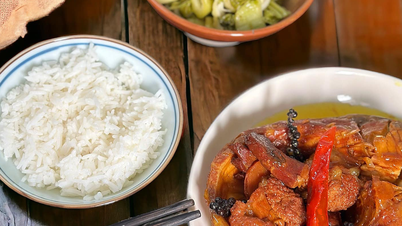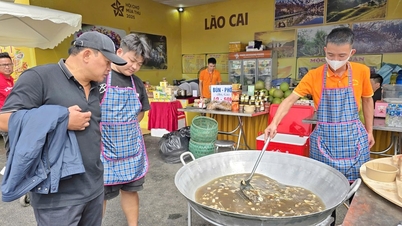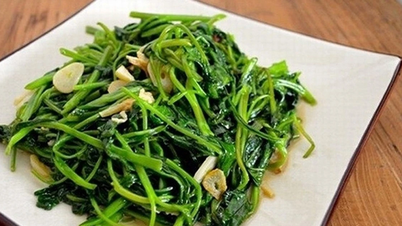Dirty meat can be easily "camouflaged" into many products.
According to Dr. Le Van Thieu, Department of General Infection (Central Hospital for Tropical Diseases), diseased pork, especially meat that has signs of slight decomposition, can be mixed into dishes such as sausages, Chinese sausages, ham, etc. by fraudulent establishments. Because in the production process of these products, the meat is ground, marinated with strong spices, combined with additives and flavorings. Signs such as the foul smell and unusual color of spoiled meat are almost completely hidden.
Not stopping there, meat-filled cakes such as steamed buns and banh gio are also in the high-risk group. These dishes all have the process of mincing the meat and marinating it carefully, so if the original meat source is not guaranteed, consumers will hardly be able to recognize it just by appearance or taste.
People cannot detect it with their naked eyes or sense of smell, especially with fast food and popular snacks nowadays. So what are the risks when eating meat and sausages, processed and cooked products from these "dirty" foods?

Illustration photo
Experts say that cooking is not always safe, especially with diseased or rotten meat. During the decomposition process, bacteria such as Salmonella, E. coli, Clostridium perfringens not only thrive but also secrete dangerous toxins, especially endotoxin - a substance with high heat resistance.
Even when boiled at 100°C, the toxin is not completely destroyed. This means that even when cooked, meat still poses a risk of food poisoning.
In addition, rotten meat also produces histamine, putrescine and cadaverine – compounds that are harmful to the nervous system. When accumulated in the body for a long time, they can impair immune function, cause metabolic imbalance, and increase the risk of chronic diseases.
Consumers who consume foods containing the above toxins may suffer acute poisoning. Common symptoms include fever, severe abdominal pain, vomiting, prolonged diarrhea, and in severe cases, septic shock and liver and kidney damage.
How to choose safe food?
Faced with this situation, experts recommend that consumers should be more proactive and careful in choosing processed foods. For example:
+ Do not buy floating products, unusually cheap prices, products that are too cheap may use unsafe meat to lower the cost.
+ Choose products from reputable brands, with quarantine certificates and clear labels.
+ When buying dirty meat, sausages, and processed products, you need to carefully observe the appearance of the product: The color must be natural, not unusually bright red or too dark; The surface must not be sticky, and must not have a strange, strong smell. The packaging must fully state the origin and expiration date...
+ Prioritize home processing if possible, to control the quality of ingredients from the beginning.
+ For street foods such as banh gio, banh bao… you should buy them at reputable establishments to ensure hygiene.
How much sausage is enough?
Sausages are a favorite food of both adults and children, but should they be eaten every day? Experts say the less the better.
According to national standards, the amount of nitrite, a commonly used preservative in sausages, must not exceed 30mg/kg of product. The body's daily allowance for nitrite intake is 0.06mg/kg of body weight.
Specifically, a person weighing 50kg should only consume about 3mg of nitrite per day, equivalent to about 100g of sausage (ie 1-2 sausages depending on the type). Eating more can increase the risk of absorbing substances that can cause cancer.
An important note when eating sausages or processed products is that people should combine them with fresh vegetables and fruits rich in vitamin C to limit nitrite absorption. Sausages should not be used as a main meal replacement for young children or people with weak immune systems to avoid affecting their health.
Source: https://giadinh.suckhoedoisong.vn/nhan-vu-lum-xum-thit-lon-cp-chuyen-gia-noi-gi-ve-tac-hai-khi-an-phai-thit-va-xuc-xich-san-pham-che-bien-san-ban-172250604144815578.htm



![[Photo] Flooding on the right side of the gate, entrance to Hue Citadel](https://vphoto.vietnam.vn/thumb/1200x675/vietnam/resource/IMAGE/2025/10/28/1761660788143_ndo_br_gen-h-z7165069467254-74c71c36d0cb396744b678cec80552f0-2-jpg.webp)
![[Photo] Draft documents of the 14th Party Congress reach people at the Commune Cultural Post Offices](https://vphoto.vietnam.vn/thumb/1200x675/vietnam/resource/IMAGE/2025/10/28/1761642182616_du-thao-tai-tinh-hung-yen-4070-5235-jpg.webp)
![[Photo] National Assembly Chairman Tran Thanh Man received a delegation of the Social Democratic Party of Germany](https://vphoto.vietnam.vn/thumb/1200x675/vietnam/resource/IMAGE/2025/10/28/1761652150406_ndo_br_cover-3345-jpg.webp)






















![[Photo] President Luong Cuong attends the 80th Anniversary of the Traditional Day of the Armed Forces of Military Region 3](https://vphoto.vietnam.vn/thumb/1200x675/vietnam/resource/IMAGE/2025/10/28/1761635584312_ndo_br_1-jpg.webp)











































































Comment (0)